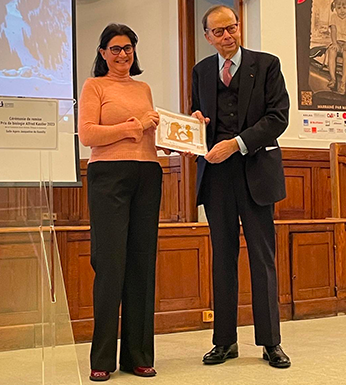

In 2023, the Animal Law, Ethics and Science Foundation (LFDA) awarded the Alfred Kastler Biology Prize to Alexandra Benchoua for her work on induced pluripotent stem cells (iPSCs), which enable the replacement of animals in pre-clinical experimentation. Read the news
Watch the FC3R webinar "Criblage sans animaux".
Present since the creation of the FC3R in 2021, Louis Schweitzer was appointed president of the COR ( or Advisory and Reflection Council) in 2022, a role he enthusiastically fulfilled until 2025, providing constant, benevolent and unifying support. His method consisted of consulting and analyzing different points of view in order to arrive at a synthesis or compromise. Defining himself as a reformer, he advocated sharing, dialogue and diplomacy to advance the cause of laboratory animals and the 3Rs.
He constantly sought to gain a detailed understanding of the legal framework for animal experimentation and the application of the 3Rs, engaging in dialogue with the various stakeholders involved in animal experimentation in France: ministerial departments, ethical review bodies, animal experimentation ethics committees, and professional associations. Drawing on his leadership experience, he has brought a pragmatic vision, based on data analysis and comparison at the European level, in order to identify avenues for progress.
He helped FC3R get established and set up, and played a part in defining its future direction. Convinced of the value of supporting FC3R in conducting high-quality research that is less dependent on animals and focused on progress, he tirelessly promoted FC3R and its work to various audiences, including the press, conferences attendees and government departments. He was a constant ambassador for our centre and its activities, as well as a staunch defender of the cause of laboratory animals. Concerned about the sustainability of the FC3R, he supported and advised it on its future developments, particularly with a view to expanding to encompass all sectors of public and private research.
Under his chairmanship, the COR was structured into several thematic working groups dedicated in particular to the analysis of severe procedures in France, the identification of indicators for monitoring and evaluating the success of 3R policies, education and training programmes in animal ethics and alternative methods, and standards and guides for good practice in animal experimentation.
At the inaugural AFSTAL conference on 12 June 2024, entitled "Science and society: the challenges", Louis Schweitzer publicly presented his vision. Recognizing the acceleration of scientific knowledge , the growing acknowledgement of animal sensitivity and the slight reduction in the use of animals in France, as well as the high severity of procedures, he advocated for ethical and societal advancements in animal experimentation, which he believes are essential for medical progress. According to him: “the obstacle is not science, but habit and a failure to question practices”.
To remedy this situation, he put forward several proposals that resulted in concrete actions by the COR working groups and the FC3R operational team.
He promoted a comparative study of European practices in order to identify ways of improving animal experimentation, particularly with a view to better understanding the reasons for the high proportion of severe procedures reported in France.
He emphasized the importance to improve the quality and reliability of annual statistics on the use of animals for scientific purposes, in order to enable the comparison with other countries and monitor progress. To harmonize the assessment of procedure severity and consolidate statistical data, the COR's severity working group has drawn up a "Guide to assessing actual severity", available to the scientific community.
He reiterated that ethics committees overseeing animal experimentation play a crucial role, but that their effectiveness could be improved by reducing their number, standardizing their practices, and allocating them greater resources.
He emphasized the importance of implementing the 3Rs principle, with a particular focus on replacement as a means of progress, and the need for substantial funding and a coordinating structure, such as the FC3R.
He has often highlighted the importance of providing training and support for individuals involved in animal experimentation — researchers, veterinarians, technicians and members of ethics committees — in order to strengthen the ethical and scientific culture of the 3Rs within institutions. This involves setting up a directory of alternative methods (AREA) and a catalogue listing guides and benchmarks for good practice (BAFiS) to facilitate access to information.
In conclusion, we endorse and perpetuate Louis Schweitzer's observation that medical science and animal welfare initiatives converge in their efforts to alleviate suffering and enhance the quality of life of those affected. We must reduce the number of cases in which improving human welfare involves animal suffering:"One health frames science and ethics".
